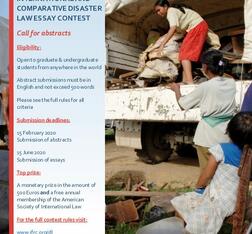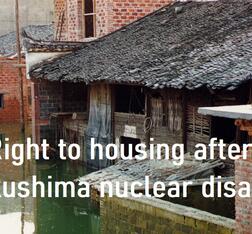
The Essay Contest is co-sponsored by: the IFRC; the American Society of International Law; the Jean Monnet Project ‘Disseminating Disaster Law for Europe’ at Roma Tre University; and the ‘International Disaster Law Project’ of the Universities of Bologna, Roma Tre, Scuola Superiore Sant’Anna, and Uninettuno. This year, the winner of the Contest was Rhys Carvosso of Cambridge University with his essay entitled “Techniques for Regulating Disasters across the Breadth of International Law: Disapplication, Exculpation, and their Shortcomings”. We spoke to Rhys about his interest in disaster law and career ambitions.
When and how did you first learn about international disaster law?
Initially, I had interests in public international law and disaster law independently. Late last year I assisted an academic at the University of Sydney with some research into Australian laws that regulate how public agencies respond to climate change-related weather events. That work touched on adaptation measures and disaster response from a domestic perspective. I have also had the opportunity to study public international law for a few years, first during my undergraduate degree in Sydney and then during my LLM at Cambridge. But it was really the Essay Contest that gave me reason to think about international disaster law as a discipline in its own right.
What opportunities have you had during your studies to learn about or explore international disaster law?
My studies have touched on particular issues in international disaster law at times, but generally only within a more established discipline such as environmental law. For example, my university courses looked at disaster risk reduction from the perspective of climate change adaptation, which is certainly crucial but painted a limited picture of the field. Having since read more of the literature on disaster law and policy, it's clear there is much more to say and teach about the area.
How would you summarise in 100 words or less the key argument developed in your essay?
My essay takes a generalist view of international disaster law, methodologically speaking. It considers how disasters are regulated indirectly across sub-fields of international law, rather than in the disaster-specific instruments developed since 2000. It argues that across these sub-fields (e.g. human rights, trade and investment law), disasters have typically been understood as events which justify ordinary international obligations not applying. But this regulatory approach depends on an anachronistic view of disasters as rare occurrences beyond human control. As modern sociology and science have demonstrated, this view no longer holds, and so the legal mechanisms which embrace them are becoming less relevant for disaster regulation.
What are your career ambitions in the medium and short term?
In the short term, I'll be working at a public international law firm in London and then as a judge's associate in Sydney. After that, I hope to begin a PhD on some aspect of international law. Along the way I'd love to do as much teaching as I can.



